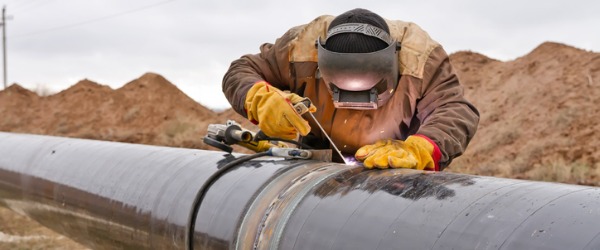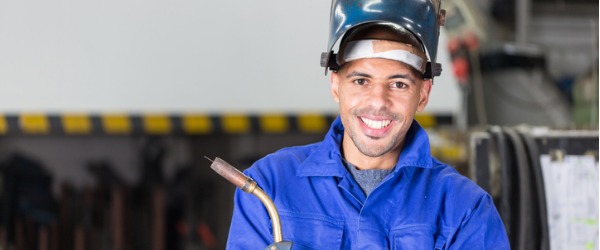What is a Welder?
A welder is a skilled tradesman who joins metal together, or fills and repairs holes on metal constructions through the use of intense heat and gas. Welders work on all types of industrial, manufacturing, and construction applications; some even work underwater to repair oil rig foundations, ship hulls and other types of subaquatic structures. Due to the almost universal need for their skills, welders are in high demand worldwide.
What does a Welder do?
The specific job duties of a welder vary depending on the skill of the welder and the industry in which they work.
Unskilled welders -
work on assembly lines, performing repetitive welding tasks. They may employ robots in order to join body panels from a car or truck or perform spot welds during the construction of specialized equipment. They may have little or no knowledge of the properties of metal, or what types of gas, wires, and settings are used to produce a stable, strong weld.
Skilled welders -
know the welding specifications of many types of metal. Through either apprenticeship or education, they learn advanced welding techniques and may hand weld or use robots to weld metal components.

While those who use robots are usually confined to working in a factory, those who weld by hand can work in almost any type of application. Construction welders join steel I-beams for high-rise structures, skyscrapers, and any other type of building that uses metal. Welders can also work on a car racing team, repairing the chassis of a damaged car or building an entirely new one. NASA even employs highly skilled welders to work on aerospace applications.
Depending on the project, welders use one of the more than 100 welding methods. In arc welding, workers either weld by hand or machine. It is the most common method of welding in which an arc of electric current combines two metal pieces with a special welding rod. Oxy-fuel welding, oxyacetylene welding, or gas welding use gasses and oxygen to produce the heat needed to melt and join pieces of metal. Other types include resistance welding, shielded metal arc welding, submerged arc welding, and the more modern laser beam welding processes. Welders may specialize in one or more of these types, as certain metals will require specific welding methods.
Welders typically work from blueprints or specifications, then use their knowledge of base metals and joining techniques to select the appropriate material for the job. They cut, position, and spot weld the metal in preparation for one of the many welding processes. The difficulty of the job depends on the type of metal and position. Hard metals like titanium and steel tend to warp less and are therefore easier to join together. Malleable, soft materials like aluminum are easily warped and subject to damage if the surface is not thoroughly cleaned; special care must be taken on the part of the welder to prevent imperfections in the weld.

Regardless of the type, welders are exposed to intense and blinding heat and must take special care to ensure their own safety and the safety of those around them. Welders wear special gloves and aprons to prevent sparks and flame from burning their clothes and skin. They also wear a special mask to prevent flash burns, which are much like an ocular sunburn. In addition to taking safety precautions, welders must monitor the metal they are welding closely. Special care is taken to prevent overheating of the metal which leads to warping, distortion, shrinkage or expansion. Welders also maintain their equipment and work with various power tools, including a grinder, to prepare metal surfaces for welding.
What is the workplace of a Welder like?
Many welders work a regular 40-hour work week though opportunities for overtime work are frequent due to the demand for welding. It is estimated that one in five welders work 50 hours or more per seven-day period. They are exposed to a number of welding-related hazards while on the job including the inhalation of gasses and particulates and the danger of falling for construction welders working on high platforms. Some companies employ welders on overnight shifts so that production can continue 24 hours a day, year-round.
Frequently Asked Questions
How long does it take to become a Welder?
There is more than one way to become a welder. The selected educational track determines the length of time you will dedicate to the process:
Welding Apprenticeship / on-the-job training – varies greatly, depending on employer and position Welding Certificate – six to eighteen months Welding Associate’s Degree – two years Welding Bachelor’s Degree – four years
Steps to becoming a Welder
Welding is sometimes described more as an art than a craft. To become a welder is to commit to a profession with many faces and levels, one that requires considerable training and often multiple certifications.
Should I become a Welder?
Before pursuing this occupation, aspiring welders should consider both its demands and the opportunities it presents.
Commercial welders must be physically and mentally fit, with excellent hand-eye coordination, and the ability to remain focused on a repetitive task for long periods of time.
Welders are exposed to hot metal, bright lights, and noxious fumes every day. Many jobs involve working around heavy equipment that can cause serious injury.
Welders need to be prepared to work in tight spaces, at elevated heights, and outside in all seasons. They need to endure many hours standing or crouching and be willing to wear goggles and other safety gear.
The occupation calls for several skills:
• Ability to understand technical plans, drawings, and blueprints • Capacity to picture what you have to do before you do it • Attention to detail – to spot flaws and defects, worn parts, and other workplace issues • Problem-solving skills • Math skills / Ability to calculate dimensions and take accurate measurements
Welders find work in a myriad of industries:
• Construction • Civil engineering • Construction engineering • Aerospace • Automotive • Agricultural engineering • Power • Shipbuilding and repair • Renewable energy • Oil and gas • Overseas construction projects
If you are comfortable with the working conditions common in the field; if the traits and skills needed in the job are aligned with your own; if the industries which hire welders appeal to you, this may be a career fit for you.
What are Welders like?
Based on our pool of users, welders tend to be predominately realistic and investigative people. These two traits clearly reflect the pragmatic tasks of a welder: to use a precise application of heat to melt, mingle, and join two pieces of metal; to monitor the welding process to prevent overheating; and to examine the welds for flaws.
Welders are also known as:
Aluminum Welder
Fabrication Welder
Maintenance Welder
Sub Arc Operator
Welder Operator